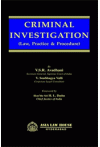- Author(s): V.S.R. Avadhani, V. Soubhagya Valli
- Publisher: Asia Law House
- Edition: 1 Ed Rp 2020
- ISBN 13 9789384410476
- Approx. Pages 944 + Contents
- Format Hardbound
- Approx. Product Size 24 x 16 cms
- Delivery Time 3-5 working days (within Kerala & South India) (Others 7-9 days)
- Shipping Charge Extra (see Shopping Cart)
.............................................................................................................................
Description
Mankind has migrated from the state of nature towards an elegant society. Crime has become part of civilization process, of course, having its adverse effects on the society. Award of punishment following conviction at a trial in a system wedded to rule of law is the product of cool reflection in the court room after adequate hearing is afforded to the parties, accusations are brought against the accused, the prosecutor is given an opportunity of supporting the charge and the accused is equally given an opportunity of meeting the accusations by establishing his innocence. This is a long but indispensable trial process. The Apex Court of India has recognised the farthest magnitude of crime while appreciating the role of proper and effective investigation in delivering justice. Explaining that speedy trial is the fundamental right of any citizen, the Court in Vakil Prasad case has broadened this view, that this right is applicable not only to the actual proceedings in court but also includes within its sweep the preceding police investigations as well.
Therefore, the Investigating Officer plays a critical role in the entire process. It should not be forgotten that the duty of the investigating officers is not merely to shore up up a prosecution case with such evidence as may enable the court to record a conviction but to bring out the real unvarnished truth. The approach in which police investigations are conducted is of critical importance to the functioning of the Criminal Justice System. Not only serious miscarriage of justice results if the collection of evidence is not properly done, or, if there is any error or malpractice, but successful prosecution of the guilty depends on a scrupulous and cautious search for truth and collection of evidence which is both admissible and probative.
.............................................................................................................................
Contents
Chapter 1 : Crime Reporting
1. Introduction
2. The First Information Report
3. FIR-Registration & Procedure
4. Procedure for Investigation
5. Power of Magistrate to direct proper investigation
6. Information as to non-cognizable cases and investigation
7. Preliminary inquiry investigation by Magistrate
Annexure - I : Manual of Instructions on investigation by ACB Officers
Annexure - II : Instructions to Investigators of CBI
Chapter 2 : Investigation & Powers of Police
8. General introduction to process of investigation
9. Examination of Witness
10. Medical Examination of Victim
11. Medical examination of accused
12. Identification of accused-power of police to take photographs of accused
13. Inquest
14. Summons to produce documents or other thing
15. Search
16. Searches in some special criminal enactments
17. Seizure
18. Police Diaries
Chapter 3 : Investigation - Assistance by Court
19. Recording of Dying Declaration
20. Recording of Statements under sec.164 CrPc
21. Holding Test Identification Parade (TIP)
Chapter 4 : Arrest, Remand and Bail
22. Arrest
23. Bail
Chapter 5 : Final Report, Cognizance & Related Matters
24. Final Report
25. Cognizance
26. 'Cognizance' in certain special Acts
27. Cognizance in prosecution of special cases
28. Limitation for taking cognizance of certain case
29. Complaints to Magistrate and Procedure
30. Check list for the Magistrate Courts
Subject Index
.............................................................................................................................
Author Details
V.S.R. Avadhani is a gold medalist in Law from Andhra University, Visakhapatnam. He was a successful civil law practitioner, poet, and columnist. Having joined judicial service in 1987, he worked at several places in various capacities. He worked as Additional Chief Judge, City Civil Court, Hyderabad, and Secretary of A.P. High Court Legal Services Committee and as Director of AP Judicial Academy.
V. Soubhagya Valli, the daughter of Sri. V. S .R. Avadhani, has an excellent academic record. She is gold medallist in Law from Osmania University, did her Master of Laws from University of Wolverhampton, West Midlands, (United Kingdom) and came out in top grade. She is specialised in International Corporate and Financial Laws, Corporate Mergers & Acquisitions, Financial Crimes and Company Law. She is well versed with US FRCP Laws. She worked as Legal Associate in Rose Law Solicitors, U.K., dealing independently with cases in relation to the UK immigration and commercial laws; worked as Strategic Legal Advisor with UK Barristers at their Indian Office in relation to the Environmental Laws.
.............................................................................................................................

